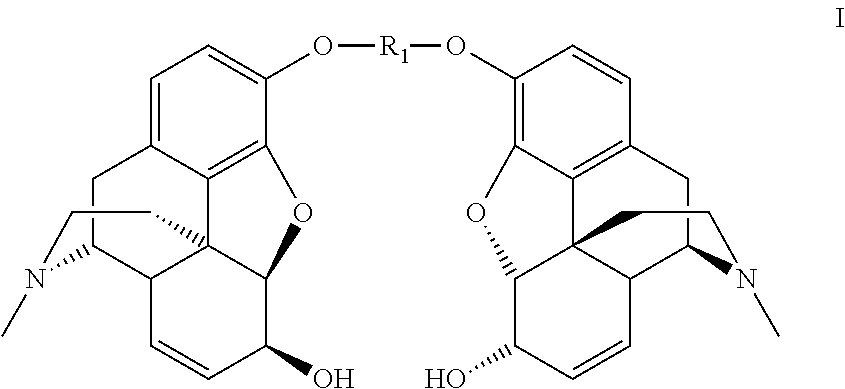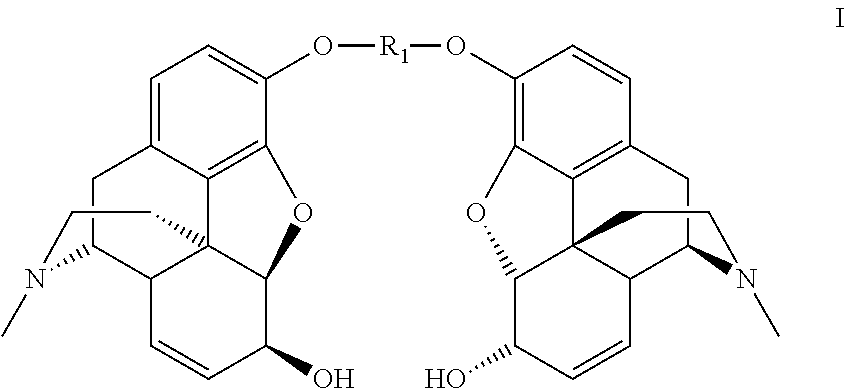Synthesis of morphine-6-glucuronide or one of the derivatives thereof
a technology of morphine and a derivative, applied in the field of process, can solve the problems of poor yield, morphine is accompanied by many undesirable side effects, and metabolite penetrates poorly into the brain, and achieves good stereoselectivity
- Summary
- Abstract
- Description
- Claims
- Application Information
AI Technical Summary
Benefits of technology
Problems solved by technology
Method used
Image
Examples
example 1
Dimorphin-3-yl terephthalate
[0149]
[0150]Terephthaloyl chloride (12.0 g, 0.0594 mol) is added portionwise over 2.5 hours to a solution of morphine monohydrate (40.0 g, 0.132 mol) in 0.66N sodium hydroxide (300 mL, 0.198 mol) and chlorobenzene (300 mL), at room temperature. The reaction medium is stirred for 15 minutes after the end of the addition.
[0151]The precipitate formed is filtered off and reslurried in a chlorobenzene / 0.66 N sodium hydroxide mixture (300 mL / 300 mL) and then washed with water (3×250 mL) to obtain the dimorphin-3-yl terephthalate in the form of white crystals (38.2 g, 92%).
[0152]1H NMR (300 MHz, CDCl3) δ 8.30 (s, 4H, CH-terephtalate), 6.87 (d, 2H, J 8.0 Hz, H-1), 6.67 (d, 2H, J 8.0 Hz, H-2), 5.83 (m, 2H, H-8), 5.32 (m, 2H, H-7), 4.95 (d, 2H, J 6.0 Hz, H-5), 4.20 (m, 2H, H-6), 3.40 (m, 2H, H-9), 3.10 (m, 2H, H-10a), 2.74 (m, 2H, H-14), 2.67-2.61 (m, 2H, H-16a), 2.47 (s, 6H, NCH3), 2.42-2.31 (m, 4H, H-10b, H-16b), 2.13-2.05 (m, 2H, H-15a), 1.96-1.92 (m, 2H, H-15b)...
example 2
Dimorphin-3-yl isophthalate
[0158]
[0159]1H NMR (300 MHz, CDCl3) δ 9.00 (t, 1H, J 1.5 Hz, H-2′), 8.44 (dd, J 1.5 Hz, J 8.0 Hz, H-4′, H-6′), 7.66 (t, 1H, J 8.0 Hz, H-5′), 6.87 (d, 2H, J 8.0 Hz, H-1), 6.67 (d, 2H, J 8.0 Hz, H-2), 5.83 (m, 2H, H-8), 5.32 (m, 2H, H-7), 4.95 (d, 2H, J 6.0 Hz, H-5), 4.20 (m, 2H, H-6), 3.40 (m, 2H, H-9), 3.09 (m, 2H, H-10a), 2.72 (m, 2H, H-14), 2.66-2.60 (m, 2H, H-16a), 2.47 (s, 6H, NCH3), 2.43-2.30 (m, 4H, H-10b, H-16b), 2.15-2.04 (m, 2H, H-15a), 1.95-1.91 (m, 2H, H-15b).
[0160]Mass (chemical ionization): [M+H]+=701.6
example 3
Dimorphin-3-yl phthalate
[0161]
[0162]1H NMR (300 MHz, CDCl3) δ 7.97 (dd, 2H, J 3.5 Hz, J 6.0 Hz, H-3′, H-6′), 7.67 (dd, J 3.5 Hz, J 6.0 Hz, H-4′, H-5′), 6.87 (d, 2H, J 8.0 Hz, H-1), 6.59 (d, 2H, J 8.0 Hz, H-2), 5.74 (m, 2H, H-8), 5.29 (m, 2H, H-7), 4.81 (d, 2H, J 6.5 Hz, H-5), 4.15 (m, 2H, H-6), 3.37 (m, 2H, H-9), 3.06 (m, 2H, H-10a), 2.70 (m, 2H, H-14), 2.61-2.56 (m, 2H, H-16a), 2.44 (s, 6H, NCH3), 2.42-2.27 (m, 4H, H-10b, H-16b), 2.08-2.05 (m, 2H, H-15a), 1.80 (m, 2H, H-15b).
[0163]Mass (chemical ionization): [M+H]+=701.6
PUM
| Property | Measurement | Unit |
|---|---|---|
| melting point | aaaaa | aaaaa |
| temperature | aaaaa | aaaaa |
| temperature | aaaaa | aaaaa |
Abstract
Description
Claims
Application Information
 Login to View More
Login to View More - R&D
- Intellectual Property
- Life Sciences
- Materials
- Tech Scout
- Unparalleled Data Quality
- Higher Quality Content
- 60% Fewer Hallucinations
Browse by: Latest US Patents, China's latest patents, Technical Efficacy Thesaurus, Application Domain, Technology Topic, Popular Technical Reports.
© 2025 PatSnap. All rights reserved.Legal|Privacy policy|Modern Slavery Act Transparency Statement|Sitemap|About US| Contact US: help@patsnap.com



